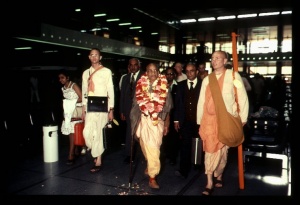CC Adi 5.140 (1975): Difference between revisions
(Vanibot #0027: CCMirror - Mirror CC's 1996 edition to form a basis for 1975) |
(Vanibot #0020: VersionCompareLinker - added a link to the Version Compare feature) |
||
| Line 2: | Line 2: | ||
<div style="float:left">'''[[Sri Caitanya-caritamrta (1975)|Śrī Caitanya-caritāmṛta (1975)]] - [[CC Adi (1975)|Ādi-līlā]] - [[CC Adi 5 (1975)|Chapter 5: The Glories Of Lord Nityānanda Balarāma]]'''</div> | <div style="float:left">'''[[Sri Caitanya-caritamrta (1975)|Śrī Caitanya-caritāmṛta (1975)]] - [[CC Adi (1975)|Ādi-līlā]] - [[CC Adi 5 (1975)|Chapter 5: The Glories Of Lord Nityānanda Balarāma]]'''</div> | ||
<div style="float:right">[[File:Go-previous.png|link=CC Adi 5.139 (1975)|Ādi-līlā 5.139]] '''[[CC Adi 5.139 (1975)|Ādi-līlā 5.139]] - [[CC Adi 5.141 (1975)|Ādi-līlā 5.141]]''' [[File:Go-next.png|link=CC Adi 5.141 (1975)|Ādi-līlā 5.141]]</div> | <div style="float:right">[[File:Go-previous.png|link=CC Adi 5.139 (1975)|Ādi-līlā 5.139]] '''[[CC Adi 5.139 (1975)|Ādi-līlā 5.139]] - [[CC Adi 5.141 (1975)|Ādi-līlā 5.141]]''' [[File:Go-next.png|link=CC Adi 5.141 (1975)|Ādi-līlā 5.141]]</div> | ||
{{CompareVersions|CC|Adi 5.140|CC 1975|CC 1996}} | |||
{{RandomImage}} | {{RandomImage}} | ||
==== TEXT 140 ==== | ==== TEXT 140 ==== | ||
| Line 13: | Line 12: | ||
:daivī vā nāry utāsurī | :daivī vā nāry utāsurī | ||
:prāyo māyāstu me bhartur | :prāyo māyāstu me bhartur | ||
:nānyā me | :nānyā me 'pi vimohinī | ||
</div> | </div> | ||
| Line 27: | Line 26: | ||
<div class="translation"> | <div class="translation"> | ||
"Who is this mystic power, and where has she come from? Is she a demigod or a demoness? She must be the illusory energy of My master, Lord Kṛṣṇa, for who else can bewilder Me?" | |||
</div> | </div> | ||
| Line 34: | Line 33: | ||
<div class="purport"> | <div class="purport"> | ||
The playful pastimes of the Lord caused suspicion in the mind of Lord Brahmā, and therefore Lord Brahmā, to test | The playful pastimes of the Lord caused suspicion in the mind of Lord Brahmā, and therefore Lord Brahmā, to test Kṛṣṇa's Lordship, stole all the Lord's cows and cowherd boys with his own mystic power. Śrī Kṛṣṇa responded, however, by replacing all the cows and boys in the field. Lord Balarāma's thoughts of astonishment at such wonderful retaliation are recorded in this verse ([[SB 10.13.37]]). | ||
</div> | </div> | ||
Latest revision as of 18:20, 26 January 2020

A.C. Bhaktivedanta Swami Prabhupada
TEXT 140
- keyaṁ vā kuta āyātā
- daivī vā nāry utāsurī
- prāyo māyāstu me bhartur
- nānyā me 'pi vimohinī
SYNONYMS
kā—who; iyam—this; vā—or; kutaḥ—from where; āyātā—has come; daivī—whether demigod; vā—or; nārī—woman; uta—or; āsurī—demoness; prāyaḥ—in most cases; māyā—illusory energy; astu—she must be; me—My; bhartuḥ—of the master, Lord Kṛṣṇa; na—not; anyā—any other; me—My; api—certainly; vimohinī—bewilderer.
TRANSLATION
"Who is this mystic power, and where has she come from? Is she a demigod or a demoness? She must be the illusory energy of My master, Lord Kṛṣṇa, for who else can bewilder Me?"
PURPORT
The playful pastimes of the Lord caused suspicion in the mind of Lord Brahmā, and therefore Lord Brahmā, to test Kṛṣṇa's Lordship, stole all the Lord's cows and cowherd boys with his own mystic power. Śrī Kṛṣṇa responded, however, by replacing all the cows and boys in the field. Lord Balarāma's thoughts of astonishment at such wonderful retaliation are recorded in this verse (SB 10.13.37).